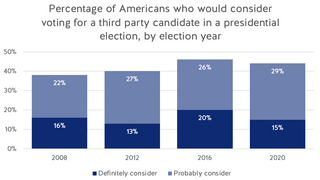Democratic Senator Joe Manchin of West Virginia is perhaps best known for his stonewalling of Democrat-led legislation alongside Arizona Senator Kyrsten Sinema in the first two years of the Biden administration. While Manchin’s maverick-style spoiler role in the Democrat-led Senate may have earned him the epitaph of “America’s biggest political tease” by Democrat Whip Dick Durbin, Manchin’s headlining of an event with the No Labels group this week sparked more grave concerns among Democrats about the Senator’s potential to spoil their chances in the next presidential election.
‘No Labels’ is a non-partisan political movement, working to unite moderates in the two major parties and shepherd a centrist presidential candidate to the top job. The group appears to be gaining ground as majorities of registered voters in both parties say they want neither Presidents Biden or Trump to run for election again in 2024, and both leading candidates have approval ratings of less than 40 per cent.
The chances of a third-party candidate winning the White House are slim, but the chances of a third-party spoiler role are much greater.
According to a No Labels’ commissioned survey, in a three-person race between an anonymous third-party moderate candidate, Joe Biden and Donald Trump, the moderate candidate received 20 per cent support, Trump received 33 per cent and Biden, 28 per cent. The figures advance Trump’s lead over Biden by five percentage points when a hypothetical third candidate is considered, versus one point in a two-person contest. Early polls from several other sources show a similar result, with Trump/Republicans gaining a one to three percentage point lead over Biden/Democrats in a three-candidate race, where Biden/Democrats otherwise have a lead.
Polling before Election Day often suggests around 40 per cent of voters would consider voting for a third choice, yet election results show few with this intention will cast their vote for an alternative. Only two per cent of votes went to third choices in 2020 and more than five per cent in 2016.
Despite this, in a close election (which was certainly the case in both 2016 and 2020), these small margins of support for third choices may just be enough to affect candidates’ chances at winning the key battleground states of Arizona, Georgia, Pennsylvania and Wisconsin.
Manchin’s appearance at the No Labels event this week and the findings from some of this recent polling may have spooked Democrats, but it is still too soon to know just how these trends may play out next November. What is sure is that the pressure is on for the two major parties to reach disaffected moderate to improve their chances at the presidency.
This commentary originally featured in the 46th newsletter.






